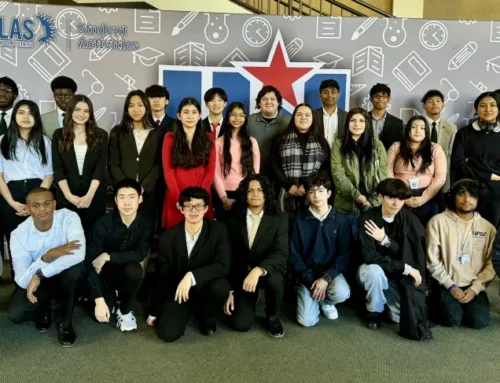 Intro: In this week’s episode of The Uninformed Parent, I spoke with Louise Kahn Elementary Principal Monica Marquez and took a tour of the campus. It’s clear what Marquez is sculpting Kahn to be: not just any school, but a school shaped to each child’s needs. One way Kahn’s campus is putting this into action is through individualized data, tracking each child’s progress over time. Under her leadership, Louise Kahn has been successful in retaining the students entrusted to the campus — and you can see why. At the close of the episode, I talked to Sunset executive director Reyna Sotelo who, as the former Botello Elementary principal, is familiar with successful schools. Sotelo gave a quick rundown of Sunset campuses and what they’re doing to get the word out.
Intro: In this week’s episode of The Uninformed Parent, I spoke with Louise Kahn Elementary Principal Monica Marquez and took a tour of the campus. It’s clear what Marquez is sculpting Kahn to be: not just any school, but a school shaped to each child’s needs. One way Kahn’s campus is putting this into action is through individualized data, tracking each child’s progress over time. Under her leadership, Louise Kahn has been successful in retaining the students entrusted to the campus — and you can see why. At the close of the episode, I talked to Sunset executive director Reyna Sotelo who, as the former Botello Elementary principal, is familiar with successful schools. Sotelo gave a quick rundown of Sunset campuses and what they’re doing to get the word out.
Keri Mitchell: Dr. Sotelo this is your first year doing the executive director position?
Reyna Sotelo: Yes, it is.
Keri Mitchell: But you have a reputation that precedes you from Botello, and how long were you at Botello?
Reyna Sotelo: I was there five years. Yes.
Keri Mitchell: Okay. First, tell me like what is it like to transition from overseeing one school to overseeing how many schools do you oversee?
Reyna Sotelo: Nine. I oversee nine. Eight of them are in the Oak Cliff area and one of them is in the Uptown area. It’s Travis Vangard.
Keri Mitchell: Oh, you do Travis?
Reyna Sotelo: Yes.
Keri Mitchell: Okay.
Reyna Sotelo: So I started this position in January, and I had all of the Sunset schools as well as Trini Garza. In June, Trini Garza went to Molina feeder pattern and I got Travis. Overseeing the nine campuses is, it’s a lot of fun. I love doing jobs that are fun, and while I was at Botello, I had a lot of fun with all of the initiatives that I had and wanted to have a college preparatory and that’s why we did AVID. We wanted to make sure we had the kids understanding colleges, not just Texas colleges but nationwide colleges. And we did a lot of different things, and everything was purposeful. It all had related to go into college, having fun and achieving your goals. So this role, it’s the same thing. The campuses have the same goals, and so being able to assist in any struggles or take on any challenges, because I did it at Botello thinking I can help in that area. Okay, let’s do it together. Let’s go. Let’s push it up the next level.
Keri Mitchell: So you’re principaling principals as opposed to principaling the campus necessarily. Interesting. And Kahn is one of them.
Reyna Sotelo: Yeah.
Keri Mitchell: Okay. How long have you been here?
Monica Marquez: I’ve been at this campus 20 years.
Keri Mitchell: You’ve been here 20 years?
Monica Marquez: Yes.
Keri Mitchell: Wow. That’s impressive.
Monica Marquez: Yes.
Keri Mitchell: So you were a teacher? What did you teach?
Monica Marquez: I taught first grade, and then I taught third grade.
Keri Mitchell: Okay. And then you became the principal?
Monica Marquez: I became the academic coordinator.
Keri Mitchell: First steps.
Monica Marquez: Then, I became the assistant principal, and so I became the principal. This is my fifth year.
Keri Mitchell: Wow.
Monica Marquez: Yes.
Keri Mitchell: You don’t get that very often where someone stays in one place.
Monica Marquez: Right?
Keri Mitchell: Why has that worked for you?
Monica Marquez: Because I know my community. Because I grew up here.
Keri Mitchell: You did?
Monica Marquez: Well, I did down the street. I’m an Oak Cliff native, so I know pretty much everybody in the community. It’s nice to have a few teachers who I was their teacher, and now they teach here.
Keri Mitchell: That’s incredible. That’s a somewhat common theme I feel like is that people who live here want to teach and administer here. I get a lot of comments like that.
Monica Marquez: Give back to our own community.
Keri Mitchell: Mmhmm. So tell me about Kahn. What is there to know about Kahn?
Monica Marquez: The culture here at Kahn is amazing like we are really, truly a family. We call ourselves the Kahn family, and so you can feel the culture as you walk through the school. The teachers are so committed here. I love it. I love their attitude, how they go above and beyond. And it’s just, it just makes coming to work so much fun.
Keri Mitchell: That’s awesome. What’s your campus like, where are families coming from? One of the things that’s a common theme around this area is there’s tends to be a lot of places where there are people just kind of like opting out of public school completely. That’s one of the things we’re exploring with this is what’s the deal with that basically.
Monica Marquez: The majority of the kids that we have are coming from apartment complexes around here. I want to say we have a few of our students that live in homes. But the majority of our students are coming from all these apartment complexes. As far as leaving like our community, well because we’ve built this community and they know our teachers and the majority of our teachers have been here for a while, so they come back. So, you can go to our Pre-K class, and we have students that we had here and other students their kids are coming here, and parents who don’t even have kids here anymore who volunteer in our volunteer center. So I think it’s just making them feel like they’re part of our school.
Keri Mitchell: They don’t come and go. They come and stay.
Monica Marquez: They don’t come and go. They come and stay.
Keri Mitchell: Are there a lot of kids zoned here that don’t go here?
Monica Marquez: We have about 50 transfers, and those are probably transfers of students. I want to say the majority of them are who moved out of our community but wanted to keep coming here. So I think we only have maybe 10 that are new coming.
Keri Mitchell: That’s great. How many kids go to school here?
Monica Marquez: We have 568 kids.
Keri Mitchell: That’s a good sign. Yeah. What are you most excited about?
Monica Marquez: I’m excited about our, we have a tech teach program. So we train Texas Tech to be teachers. I love that program. That’s my big thing like training a new teacher. Exciting this year, is that we’re doing a lot of new things like our kids are doing coding. I’m really excited about all the new stuff and our new teachers and their attitude towards it has just been amazing.
Keri Mitchell: How do kids do coding?
Monica Marquez: We have a coding club, so we have three teachers who run the coding club. It’s first grade through third grade, and then they do a fourth and fifth.
Keri Mitchell: And they just sit at computers and code?
Monica Marquez: She does like a whole lesson with them, and then they create a video game.
Keri Mitchell: They create video games. This is mind blowing for me.
Monica Marquez: Yeah. It’s amazing and a lot, and I’m really excited because this year we’re seeing way more hands on [programs] like science and math. And it’s just, you can tell the kids are just enjoying it.
Keri Mitchell:They see a big difference with that hands on [programming]. What else should people know about Kahn?
Monica Marquez: We’re a great school. Our teachers work really hard, and our staff culture is amazing. I think if they would come to visit, they would see and feel the culture here at our school and want to be part of it. And we’ve had several parents this year who have just come to visit, and they’ve stayed.
Keri Mitchell: Really?
Monica Marquez: Yes, we had one last week. They were at a private school, and she came. She took a tour, and she was like, “Oh, I’m staying here.”
Keri Mitchell: In the middle of the year, she just switched?
Monica Marquez: Yep, she switched. So he started last Friday. I like the community part. But when I say that I can go home, and I can feel good about the level of education that the kids are getting here. I think that’s what makes my job so easy.
Keri Mitchell: You don’t hear that. I mean, not that there aren’t amazing principals out there, but to have that kind of confidence in your campus.
Monica Marquez: I do. I have a lot of confidence in my teachers and my staff. When I say they go above and beyond, they will go above and beyond. Like we have a new teacher, Mr. Hartman and he, if a child does not get hit, he’s not leaving, he’s going to make sure that that child gets it. And if he has to stay after school and call the parent and say, ‘You know what, we worked on this all day, he didn’t quite get it. Can he please stay after school? I want to help them.’ And then if the parent comes, he tries to work with the parent. And he’s homegrown too because he used to be our cafeteria manager. We encouraged him to go and be part of the tech teach. And he graduated. First one in his family to graduate from college, and now he’s a teacher here.
Keri Mitchell: That’s incredible. What grade does he teach?
Monica Marquez: He teaches fifth grade, fifth grade math.
Keri Mitchell: Not in my wheelhouse.
Monica Marquez: Right?
Keri Mitchell: But great. Dr. Sotelo I know you said this is a great school. Tell me why you think that?
Reyna Sotelo: One of the things I really enjoy about this campus is as Ms. Marquez was saying is that teachers really get to know their kids. And not only do they get to know them as far as their family, their emotional level, their feelings as far as the whole child but they also know the child where their academic strengths are as well as their challenges. They address all of their challenges through their strengths. There is not one time I can have a conversation with Ms. Marquez or her assistant principal or even the instructional coaches where they’re not able to talk about each child and each child where they’re at in reading, in math and science and social studies. So that’s where I get really excited about Kahn and what they do, because they aren’t successful without knowing each one of their kids. The reason why they’re successful is because they know all of their kids.
Keri Mitchell: That’s impressive.
Monica Marquez: That’s what we’re doing today, half day planning. So we’re going over our data, and they’re creating action plans for each of their students. So that’s what we’re working on.
Keri Mitchell: What data do you look at when you…
Monica Marquez: Well, right now we have our beginning of the year data, and then we have our common assessment data. So, we’ve been going through that. And then first we have all of our praises, what did they do great at and then, but what do we need to work on? And they do it by individual student.
Keri Mitchell: Okay, so I was going to ask that. So it’s not just what do we need to work on as a campus or as a classroom. It’s what this student’s individually doing really well. We need this. Okay.
Monica Marquez: Right.
Keri Mitchell: It sounds a lot like and I don’t know if this is something you guys are doing but personalized learning without the catchphrase right? Did I get that?
Monica Marquez: Yes.
Keri Mitchell: I’m trying to think if there’s anything else. Could you give me a tour?
Monica Marquez: Yeah, I can give you a tour.
Keri Mitchell: What does five star proud mean?
Monica Marquez: We have five distinctions from the state.
Keri Mitchell: Congrats.
Monica Marquez: Yes. Thank you. When I first took over the school, we were IR. And then they asked me if I would do tech teach program. So I was like, “Okay, we’ll try it.” It worked out really well, because we had seven teachers who moved, got pregnant and wanted to stay home. So we had a lot of openings, so I was able to hire those seven. And so they’ve been here ever since.
Keri Mitchell: So, I misinterpreted tech teach. It’s not like technical teach. It’s like from Texas Tech? Got it. Okay, got it. So you get basically, are they still called “student teachers”?
Monica Marquez: They’re student teachers, we call them student intern.
Keri Mitchel: And then so they come and they…do that and then you hire the good ones?
Monica Marquez: Yes. That’s right. And I’m pretty much all of them were good. So that’s good.
Keri Mitchell: That’s good. How do you take an IR school and make it a school with five distinctions?
Monica Marquez: It was a lot of work, but you know what, I have a great team, assistant principal and my CICs are amazing. So I really couldn’t have done it without them. It was changing the teachers mindset, because that’s a pretty big blow.
Keri Mitchell: Is it?
Monica Marquez: Yeah, and so it was, you know, building them back up. We can all do it, but we have to be a team. And so it was just kind of, you know, changing their mindset. We all worked hard. It was like, it was everybody’s responsibility. These are all of our kids. So we’re going to do this together.
Keri Mitchell: Does it take what you were talking about, knowing each student individually and figuring out how to bring them up?
Monica Marquez: Yes.
Keri Mitchell: So is that the main thing you did that was different than before?
Monica Marquez: It was more like where we looked at each child. We’re not looking as a whole, we’re looking at each child.
Keri Mitchell: That’s something that I would say we as parents are not always good at doing. Before you’re looking at a school, you look at the whole school and you say, “Oh, this school is good, or it’s bad or it’s so-so” not really thinking about, but how will my child do?
Monica Marquez: Right, what are they doing for my child? How are they taking care of my individual child? I know as a parent that’s what I look for too like, are they really concerned about my child. It’s not about the whole. All of these kids are our kids, and we look at each individual child until we have a wonderful SST.
Keri Mitchell: What’s SST?
Monica Marquez: It’s our student support team.
Keri Mitchell: Okay.
Monica Marquez: So, it’s the counselor, it’s the nurse, myself, the assistant principal, the teacher and then the CICs.
Keri Mitchell: What’s a CIC?
Monica Marquez : She’s a campus instructional coach. So we get together, if a teacher has a concern, she brings a concern too. It can be behavioral, can be academic, it can be, you know, other concerns like that. And then they bring it and then as a team, we come up with ways that we can help that individual child. We bring in the parents. They’re a part of the committee, so we all talk about what will be some good solutions, things that we could do, things that they can do at home. And so that’s been really good for our campus.
Keri Mitchell: Wow, do you do those…is that like a daily basis kind of thing?
Monica Marquez: It’s weekly, every Wednesday.
Keri Mitchell: It’s very colorful in here.
Monica Marquez: Thank you.
Keri Mitchell: That’s on purpose I assume?
Monica Marquez: Yes. That’s inviting for the kids. So, these are our first, second and third, and these are a few third graders. And this is Mr. Hartman’s class right here, the one I was telling you about.
Keri Mitchell: So he actually went through this program?
Monica Marquez: Yes.
Keri Mitchell: Is it a program that’s done locally? Or is it done in Lubbock?
Monica Marquez: It’s done here.
Monica Marquez: So this is Ms.Washington, sorry to interrupt your lunch. These are our CICs, reading and math.
Keri Mitchell: Nice to meet you. I’m Keri Mitchell.
Monica Marquez: She’s from the Advocate, the Oak Cliff Advocate.
Keri Mitchell: Nice to meet you. I don’t want to interrupt you. Sorry.
Ms. Washington: No you’re fine.
Monica Marquez: And this is what we do. This is our data.
Keri Mitchell: Oh, so you can just look at it.
Monica Marquez: Yeah.
Keri Mitchell: Every single student?
Monica Marquez: Yes.
Keri Mitchell: And this is…this week, this month or just the beginning of the year?
Monica Marquez : Those are the beginning of the year.
Keri Mitchell: Okay.
Monica Marquez: Those are our lower grades. And then, we just finished our common assessments so that’s what we’re doing today.
Keri Mitchell: Okay. That’s great. What’s the color you want to see?
Monica Marquez: Green.
Keri Mitchell: Ok, so by the end of the year, you’re hoping a lot more green is going on?
Monica Marquez: Yes.
Keri Mitchell: Okay.
Monica Marquez: But at the beginning, what we do is we pull, we pull their history, each child. So we know how they did kinder, first, second. We can kind of tell where the gaps were, if we closed any of those gaps, or if the gaps got bigger, and then what do we need to do?
Keri Mitchell: Yeah. Okay. Do you have historical data on every kid?
Monica Marquez: We do. We do. It’s on my data portal.
Keri Mitchell: Okay, mostly because they come and stay?
Monica Marquez: Yes.
Keri Mitchell: Yeah. That makes it easy.
Monica Marquez: So we go through and do learning walks.
Keri Mitchell: What does that mean?
Monica Marquez: We go through our teacher rubric and we have one focus, say it’s student engagement. This is what we want to see. With the teacher rubric, like with the TEA rubric, and we do it with teams. Because we have such a great culture here we can give each other feedback and…
Keri Mitchell: No one takes it personally?
Monica Marquez: No.
Keri Mitchell: That’s tough.
Monica Marquez: That’s the part that I love. Everybody wants to grow and everybody will take whatever you tell them and say ‘ok, this is how I’m going to fix it.’
Keri Mitchell: So like the parent that came a couple weeks ago and toured. What are they asking, and what are they wanting to know?
Monica Marquez: They ask about our scores. How do we do? How are the teachers in the specific grade that they’re going to? What activities we have? They’re always concerned about like the clubs and things like that. Do we have after-school care? I think they just want to get a feel like is my child going to be safe here? I think that’s their big concern.
Keri Mitchell: And what do you tell them?
Monica Marquez: Yes, we tell them all the time. We are a safe environment. You can get to meet the teachers. I try to get them to meet the teachers. They always leave like, “You know what? I’m coming back.” So, we’ll take you.
Keri Mitchell: That’s a good, that’s a good deal.
Monica Marquez: She’s our parent liaison.
Keri Mitchell: Oh, parent center. What is that?
Monica Marquez : All our volunteers go through here, so they’ll tutor. They’ll pick up kids. They have groups of kids that they’ll tutor. They’ll read in the library. But she also does a class for the community on Fridays. It’s like for babies, and one and two and three year olds. She reads to them. They do activities with their parents. It’s like a big community affair because they bring food and they just love it.
Keri Mitchell: All the awards, that’s great. Anything else that you want to talk about, about Kahn specifically?
Reyna Sotelo: If any parent is looking for any campus as far as what would fit their personality, because all of my schools in Sunset as well as in Dallas ISD, every campus has their own personality. And I think the personality I can say for Kahn is, you know, they do get to know the whole child but they also you can see the personality with teachers, as far as they are excited and intentional with everything that they do. And they are very passionate as Ms. Marquez said.
Keri Mitchell: That’s great.
Reyna Sotelo: Yeah.
Keri Mitchell: It was interesting to me in talking about the school. I’m familiar enough with, you know, buzzwords. And I always ask acronyms. With those kinds of things, I know some of the programs that are kind of pushing out, and I guess you what you described was that without the titles, right, which was interesting. Yeah.
Reyna Sotelo: Yeah. That’s true.
Keri Mitchell: I can come up with personalized learning: check. SEL: check. You know, all those things.
Reyna Sotelo: It’s embedded within the culture what she does. It’s not like, “Okay, now it’s SEL time” or anything of that nature. It is embedded within the culture and the belief systems of this campus.
Keri Mitchell: Very cool. I don’t want to keep you forever, because I know you have training and stuff.
Monica Marquez: Yeah. We have fourth grade training. It was nice meeting you.
Keri Mitchell: No, I just wanted to ask kind of about the other schools in Sunset. You mentioned personality. I would love to hear me about that.
Reyna Sotelo: Yeah. It’s really interesting, because like every campus like, you know, it’s not just necessarily a niche, but they do have their personality. And, you know, I mentioned Winnetka to you, and Winnetka has the robotics initiative. I know they have coding here. Winnetka has dual language and robotics, and they are national winners when it comes to robotics.
Keri Mitchell: I remember that. We do these stories on occasion that are just very simple on our website and put them on Facebook, and they just explode. That was one of them. The robotics story is one of them.
Reyna Sotelo: They went national. Lida Hooe with their AVID initiatives, and they’re doing a lot of leadership and, you know, college preparatory. Ms. Hall over there. She’s new to the campus, and she’s growing into the mindset of, and you mentioned it, personalized learning without the title. She’s doing a data driven instruction, and then some when it comes to balanced literacy in small stations with math. So every campus has something going. Everyone has personalities.
Keri Mitchell: Let’s talk a little bit more about kind of, with families that are kind of opting in and opting out. You were a principal, you saw that dynamic at your own campus. What’s going on?
Reyna Sotelo: When I work with my principals, our biggest drive is very much like what Ms. Marquez is doing, getting to the parents even more. And you know, as they talk to parents, those parents will talk to more parents. A lot of it is just word of mouth. Yes, we educate children, but what else do we do? I think it’s that message that we want to make sure that parents understand is, yes, we educate children, but we also do much more.
Keri Mitchell: Yeah. What you’re talking about, if you’re gonna use a formal term, is almost marketing. Well, supposedly, you can’t just sit and be a good school anymore. You have to get out there and here’s why we’re a good school and here’s all the things we do. Oak Cliff has a long history of strong, supportive schools, alumni programs are crazy around here. Sunset has a really active alumni program. It is not uncommon for us to put something on a website about a school and it just go bonkers on social media. And it has to do with those alumni groups.
Reyna Sotelo: You know, share, share, share, share, share. Yes.
Keri Mitchell: So it’s not that there’s not involvement and engagement. It’s not that there aren’t kids that are here and active. There’s just kind of certain segments of the population that aren’t…I don’t know if it’s because they’re newer. I don’t know if it’s because they’re just unfamiliar. I don’t know if it’s just different social segments and cultural. That’s kind of what we’re finding. Those are the kinds of questions were asking.
Reyna Sotelo: And I think it’s where principals are, you know, we’re learning different facets as well. It is, like you mentioned earlier, it’s marketing, and we’re just going to get stronger at it.
Keri Mitchell: Anything else you want to say that you didn’t get chance to?
Reyna Sotelo: No, I’m sure I’ll think of something.
Keri Mitchell: Well, you can call me anytime.
Outro: Thanks for listening to The Uninformed Parent. In the next episode, we’ll talk to a Winnetka Heights mom who sends her children to a public Montessori school. This podcast is a production of Advocate Magazines with music by HookSounds.





